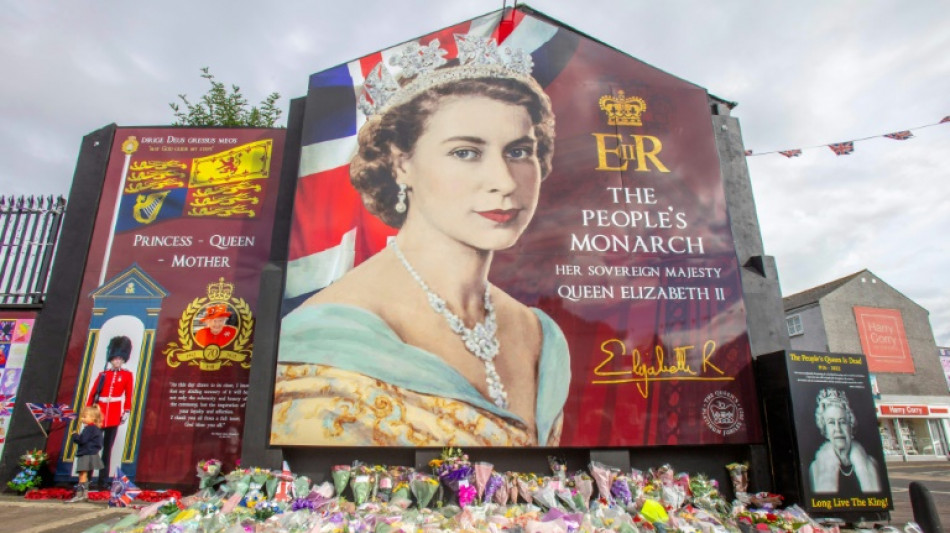
New king visits a tense and changing Northern Ireland

As he tours the four corners of his fractious new kingdom, Charles III faces the most testing task of reconciliation in Northern Ireland.
Scotland, which Charles visited on Monday, may be angling for a new referendum on independence but armed resistance there to the Crown waned centuries ago.
Northern Ireland only achieved peace in 1998 -- and it remains fragile.
The devotion of Northern Ireland's unionists to Queen Elizabeth II bordered on the reverential, integrated with their wider sense of belonging to the United Kingdom, which they feel is under threat as never before.
On Belfast's staunchly unionist Shankill Road, a mural tribute for Elizabeth's Platinum Jubilee celebrations in June has drawn a steady stream of mourners and flowers.
Shankill resident Marina Reid, 54, cited reports that have sparked deep anger among unionists, of a few nationalists letting off celebratory fireworks and singing songs since the queen's death last week.
"That tells you everything about the respect we're getting from them in our time of grief," she told AFP.
Northern Irish police are investigating but the reports do not reflect the response of the broader community of pro-Irish nationalists.
- 'Courageous' -
"I recognise that she was a courageous and gracious leader," Sinn Fein vice president Michelle O'Neill, who is in line to become Northern Ireland's first minister, said Monday at a special session of the regional assembly in Stormont.
She hailed "the significant contribution Queen Elizabeth made to the advancement of peace and reconciliation between the different traditions on our island, and between Ireland and Britain during the years of the peace process".
When he meets the region's feuding political leaders on Tuesday at the royal estate of Hillsborough Castle, south of Belfast, Charles will receive tributes from pro-UK parties and the respectful sympathies of nationalists who nevertheless can see reunification with Ireland drawing closer.
Charles will then head on to an Anglican religious service in Belfast, set to be attended by all faiths, including Protestants and Catholics.
The president, prime minister and foreign minister of Ireland also plan to participate.
For the first time in its 101-year history, the population of a region expressly carved out as a Protestant fiefdom is passing to a Catholic majority, upcoming census data is expected to show.
Elections held in May were won by Sinn Fein, formerly the political wing of the paramilitary Irish Republican Army (IRA), which in 1979 assassinated Louis Mountbatten, the uncle of the queen's late husband, Prince Philip.
- 'Unsettled' -
But the Stormont government remains suspended, with the Democratic Unionist Party (DUP) bitterly opposed to post-Brexit trading rules between Brussels and London -- which Prime Minister Liz Truss's new government is threatening to rip up failing concessions from the European Union.
Sinn Fein refuses to recognise the authority of the British monarchy in Northern Ireland, and does not take up its seats in the UK parliament in London.
O'Neill boycotted Sunday's ceremonial proclamation of Charles III as king at Hillsborough.
But Sinn Fein says it will meet the king along with the other leaders, and attend the service at St Anne's Cathedral to both honour the queen's long service and to respect the unionist community's profound sense of loss.
"Unionists are feeling very unsettled in terms of their identity, unsettled about their place in the United Kingdom after Brexit," Deirdre Heenan, professor of social policy at Ulster University, told AFP.
"The queen's passing is a further blow to their confidence and identity. They will of course embrace the new king, but they will be aware that this could usher in seismic change," she said.
- Peace -
Elizabeth, who visited Northern Ireland 22 times as queen, played a telling role in the peace process after a historic agreement in 1998 ended the three decades of bloodshed in Northern Ireland.
In 2012, she shook the hand of former Sinn Fein minister -- and reputed IRA commander -- Martin McGuinness. A year earlier, she became the first British monarch to visit an independent Ireland.
At the end of mass on Sunday, the priest at the Catholic church of St Patrick's in central Belfast told his parishioners he intended to hold a prayer for Elizabeth, and they were free to leave if they wished.
None did, and all joined in the prayer, said taxi driver Paul Donnelly, 53, who was born in the year "The Troubles" started -- 1969 -- and whose father was maimed in a bombing by unionist militants.
"We may have had our differences but she was a mother, grandmother, who did her duty to the end," he said.
"As a kid, I saw IRA men shoot dead a British soldier. I never thought I'd see peace in this country, and she helped bring it about, 100 percent."
A. Lefebvre--BTZ

 London
London

 Manchester
Manchester
 Glasgow
Glasgow
 Dublin
Dublin
 Belfast
Belfast
 Washington
Washington
 Denver
Denver
 Atlanta
Atlanta
 Dallas
Dallas
 Houston Texas
Houston Texas
 New Orleans
New Orleans
 El Paso
El Paso
 Phoenix
Phoenix
 Los Angeles
Los Angeles



